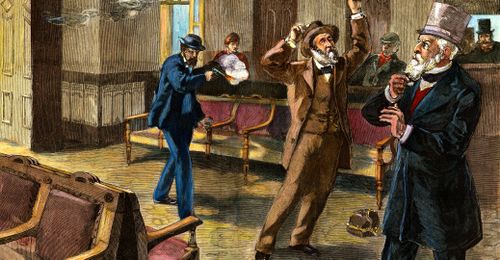Annotation:President Garfield's Hornpipe
X:1 T:President Garfield's Hornpipe M:4/4 L:1/8 K:Bb |: dc | BFDF BFDF | BABc dcde | fcAc fcAc | f=efg f_edc | BFDF BFDF | BABc dcde | fgag fedc | B2 d2 B2 :| |: (ba) | geBG EGBg | fdBF DFBf | eAgf eAgf | dBgf dBba | geBG EGBg | fdBF DFBf | =efag f_edc | B2 d2 B2:|]
PRESIDENT GARFIELD'S HORNPIPE. AKA and see "Garfield's Hornpipe," "Blue Water Hornpipe," "High Level (2)." American, Canadian, Irish; Hornpipe or Reel (Ireland). USA; New England, Missouri. Canada; Prince Edward Island, Cape Breton. B Flat Major (Brody, Cole, Kerr, Martin & Hughes, Miller & Perron, Perlman, Phillips): D Major (Sweet). Standard tuning (fiddle). AABB (most versions): AA’BB’ (Martin & Hughes).

American President James A. Garfield, the twentieth U.S. chief of state (elected in 1880) was assassinated by a lone gunman named Charles Guiteau, on 2 July, 1881, shortly after taking office, making his one of the shortest terms in that office. Guiteau likely struggled against mental illness and was a failed preacher, lawyer and businessman and was demanding a place on Garfield's staff at the assassination attempt.
The composition is credited to Harry Carleton in Ryan's Mammoth Collection (1883); Carleton (whose name is perhaps a pseudonym) is thought to have been a journeyman composer in the Boston, Mass., area, who contributed several tunes to Ryan's Mammoth, most having titles associated with the post-Civil War North. "President Garfield's" proved one of the more popular tunes from Ryan's collection, and became a staple at New England dances. However, it also has been widely disseminated in the past century and a half, becoming a popular hornpipe, for example, among Maritime Canadian fiddlers. Northumbrian concertina player Alastair Anderson introduced the tune into Northumbrian repertoire, finding it in Kerr’s Merry Melodies, vol. 2, but also being influenced by hearing New England fiddler Rodney Miller play it. As “Garfield’s Hornpipe” it is on Missouri fiddler Charlie Walden’s list of ‘100 essential Missouri fiddle tunes’. Northwest U.S. fiddlers sometimes call it "Blue Water Hornpipe", a title from the playing of fiddler Harry Johnson.

